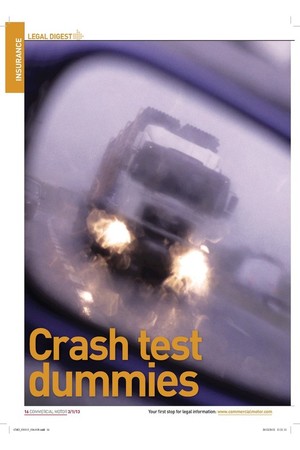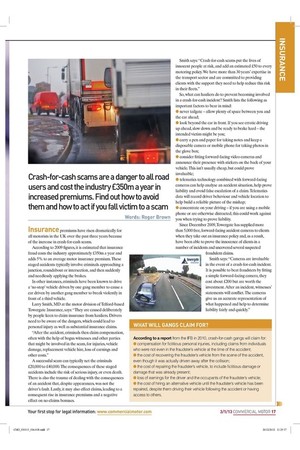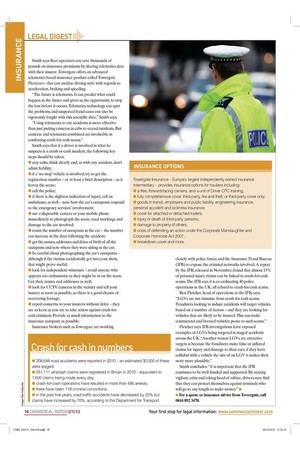Crash-for-cash scams are a danger to all road user
Page 11

Page 12

Page 13

If you've noticed an error in this article please click here to report it so we can fix it.
Crash-for-cash scams are a danger to all road users and cost the industry E350m a year in increased premiums. Find out how to avoid them and how to act if you fall victim to a scam Words: Roger Brown Insurance premiums have risen dramatically for all motorists in the UK over the past three years because of the increase in crash-for-cash scams.
According to 2009 figures, it is estimated that insurance fraud costs the industry approximately £350m a year and adds 5% to an average motor insurance premium. These staged accidents typically involve criminals approaching a junction, roundabout or intersection, and then suddenly and needlessly applying the brakes.
In other instances, criminals have been known to drive a `no-stop' vehicle driven by one gang member to cause a car driven by another gang member to break violently in front of a third vehicle.
Larry Smith, MD at the motor division of Telford-based Towergate Insurance, says: "They are caused deliberately by people keen to claim insurance from hauliers. Drivers need to be aware of the dangers, which could lead to personal injury as well as substantial insurance claims.
"After the accident, criminals then claim compensation, often with the help of bogus witnesses and other parties that might be involved in the scam, for injuries, vehicle damage, replacement vehicle hire, loss of earnings and other costs."
A successful scam can typically net the criminals £20,000 to £40,000. The consequences of these staged accidents include the risk of serious injury, or even death. There is also the trauma of dealing with the consequences of an accident that, despite appearances, was not the driver's fault. Lastly, it may also effect claims, leading to a consequent rise in insurance premiums and a negative effect on no-claims bonuses.
Smith says: "Crash-for-cash scams put the lives of innocent people at risk, and add an estimated £50 to every motoring policy. We have more than 30 years' expertise in the transport sector and are committed to providing clients with the support they need to help reduce this risk in their fleets."
So, what can hauliers do to prevent becoming involved in a crash-for-cash incident? Smith lists the following as important factors to bear in mind: • never tailgate — allow plenty of space between you and the car ahead; • look beyond the car in front. If you see erratic driving up ahead, slow down and be ready to brake hard — the intended victim might be you; • carry a pen and paper for taking notes and keep a disposable camera or mobile phone for taking photos in the glove box; • consider fitting forward-facing video cameras and announce their presence with stickers on the back of your vehicle. This isn't usually cheap, but could prove invaluable; telematics technology combined with forward-facing cameras can help analyse an accident situation, help prove liability and avoid false escalation of a claim. Telematics data will record driver behaviour and vehicle location to help build a reliable picture of the mishap; ' concentrate on your driving — if you are using a mobile phone or are otherwise distracted, this could work against you when trying to prove liability.
Since December 2009, Towergate has supplied more than 5,000 free, forward-facing accident cameras to clients when they take out an insurance policy and, as a result, have been able to prove the innocence of clients in a number of incidents and uncovered several suspected fraudulent claims.
Smith says: "Cameras are invaluable in the event of a crash-for-cash incident. It is possible to beat fraudsters by fitting a simple forward-facing camera, they cost about £200 but are worth the investment. After an incident, witnesses' statements will conflict. The cameras give us an accurate representation of what happened and help to determine liability fairly and quickly."
Smith says fleet operators can save thousands of pounds on insurance premiums by sharing telematics data with their insurer. Towergate offers an advanced telematics-based insurance product called Towergate Fleetcare+ that can analyse driving style with regards to acceleration, braking and speeding.
"The future is telematics. It can predict what could happen in the future and gives us the opportunity to stop the loss before it occurs Telematics technology can spot the problems, and suspected fraud cases can also be vigorously fought with this scientific data," Smith says "Using telematics to cut accidents is more effective than just putting cameras in cabs to record incidents But cameras and telematics combined are invaluable in combating crash-for-cash scams" Smith says that if a driver is involved in what he suspects is a crash-or-cash incident, the following key steps should be taken: • stay calm, think clearly and, as with any accident, don't admit liability; • if a `no-stop' vehicle is involved, try to get the registration number — or at least a brief description — as it leaves the scene; • call the police; • if there is the slightest indication of injury, call an ambulance as well — note how the car's occupants respond to the emergency services' involvement; • use a disposable camera or your mobile phone immediately to photograph the scene, road markings and damage to the car involved; • count the number of occupants in the car — the number can increase in the days following the accident; • get the names, addresses and dates of birth of all the occupants and note where they were sitting in the car; • be careful about photographing the car's occupants — although if the victims accidentally get into your shots, that might prove useful; • look for independent witnesses — avoid anyone who appears too enthusiastic as they might be in on the scam. Get their names and addresses as well; • look for CCTV cameras in the vicinity and tell your insurer as soon as possible, so there is a good chance of recovering footage; • report concerns to your insurers without delay — they are as keen as you are to take action against crash-forcash criminals Provide as much information to the insurance company as possible.
Insurance brokers such as Towergate are working closely with police forces and the Insurance Fraud Bureau (11-B) to expose the criminal networks involved. A report by the IFB, released in November, found that almost 15% of personal injury claims can be linked to crash-for-cash scams. The IFB says it is co-ordinating 40 police operations in the UK, all related to crash-for-cash scams.
Ben Fletcher, head of operations at the IFB, says: "LGVs are not immune from crash-for-cash scams Fraudsters looking to induce accidents will target vehicles based on a number of factors — and they are looking for vehicles that are likely to be insured. This can make commercial and liveried vehicles prone to such scams."
Fletcher says IFB investigations have exposed examples of LGVs being targeted in staged accidents across the UK. "Another reason LGVs are attractive targets is because the fraudsters make false or inflated claims for injury and damage to their cars; if they have collided with a vehicle the size of an LGV it makes their story more plausible."
Smith concludes: "It is important that the IFB continues to be well-funded and supported. By staying vigilant, calm and taking heed of advice, drivers may find that they can protect themselves against criminals who will go to any length to make money" • • For a quote or insurance advice from Towergate, call 0844 892 3470.
WHAT WILL GANGS CLAIM FOR?
According to a report from the IFB in 2010, crash-for-cash gangs will claim for: • compensation for fictitious personal injuries, including claims from individuals who were not even in the fraudster's vehicle at the time of the accident; • the cost of recovering the fraudster's vehicle from the scene of the accident, even though it was actually driven away after the collision; • the cost of repairing the fraudster's vehicle, to include fictitious damage or damage that was already present; • loss of earnings for the driver and the occupants of the fraudster's vehicle; • the cost of hiring an alternative vehicle until the fraudster's vehicle has been repaired, despite them driving their vehicle following the accident or having access to others.
INSURANCE OPTIONS Towergate Insurance — Europe's largest independently owned insurance intermediary — provides insurance options for hauliers including: • a free, forward-facing camera, and a unit of Driver CPC training; • fully comprehensive cover, third-party, fire and theft, or third-party cover only; • goods in transit, employers and public liability, engineering insurance, personal accident and sickness insurance; • cover for attached or detached trailers; • injury or death of third-party persons; • damage to property of others; • costs of defending an action under the Corporate Manslaughter and Corporate Homicide Act 2007; • breakdown cover and more.
Crash for cash in numbers • 208,648 road accidents were reported in 2010— an estimated 30,000 of these were staged; • 551,111 whiplash claims were registered in Britain in 2010— equivalent to 1,500 claims being made every day; • crash-for-cash operations have resulted in more than 486 arrests; • there have been 119 criminal convictions; • in the past five years, road traffic accidents have decreased by 23% but claims have increased by 70%, according to the Department for Transport.









































